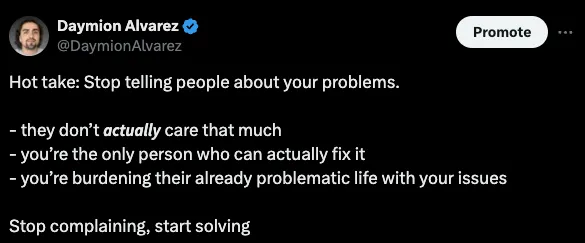Your Feelings Don’t Matter (How To Manage Your Emotions)
April 7, 2024 | Daymion Alvarez
That’s right, they don’t matter. And they never will.
In fact, the only person who cares about your feelings is you. Hate to be the bearer or bad news, but someone’s got to do it.
No matter what your mom or girlfriend might say, your feelings actually don’t matter at all.
No one cares, and you shouldn’t be concerned with how you feel. Moving on…

Nowadays, people often say that emotions are important and being in touch with them should be your main focus - I don’t necessarily disagree.
Where the disconnect is for me is when people push this idea that your emotionality is the most important thing and you should constantly strive to be in a state that makes you “feel good”.
In my opinion, that mindset will only lead you down a path of pure emotional instability and hedonism. You’ll slowly lose control of your life by always acting on your emotions and not really know why.
The way that I like to frame emotionality is simple - feel the hell out of your emotions, but continually put your best foot forward to always advance towards your goals.
Does this mean sometimes you’ll have to contain your emotionality? Damn right it does.
Does this mean you’ll have to consciously analyze yourself all the time to make sure you’re acting in accordance with your goals? Yes sir it does.
We’re often either directly or indirectly taught that “the way you feel” matters. Quite frankly, it doesn’t. If everyone runs around doing everything to make them “feel better”, society would be fucked.
Let’s look at this from a different perspective.
A frame that I picked up from Marcus Aurelius’ Meditations goes as follows: why see misfortunate in the event rather than good fortune in your ability to bear it?
In other words, bad shit happens to everyone. Why would you focus on the thing rather than the fact that you can get through it?
2-Step Framework For Success
Here's an entirely different way to look at emotionality.
The first piece is constant self-analysis. If you want to be able to control your emotions, you need to recognize when you’re feeling certain things.
If you get mad, think about why that situation made you mad.
What about it made you mad?
Was it the person in specific?
What’s the underlining thing you’re mad about?
You’re probably mad about a principal rather than the actual thing; what’s that principle?
Have you made it clear to that person that this specific thing bothers you in a calm manner?
Usually, lashing out on someone is never the right way to go about things. It only makes ego barriers fly way up. You’ll start an ego fight and you’ll never get your point across.
Chances are, you’ll permanently damage your relationship with that person. Is that what you really want?
The second piece of learning to control your emotions is consciously thinking of different ways to handle situations and applying them in real time.
This is the trickiest part of the whole situation, especially when emotions come up that are so strong it’s hard to even think properly. I like to think of emotions as an independent entity within my head.
I can look at it from all angles, figure out why it’s happening, what I can do about it, and what the next best move is.
Especially with emotions that cause you to act irrationally, it needs to be like water off a ducks back. Figure out what situation caused that emotion, what you can do to prevent (or encourage) it in the future, and do more of that thing.
It’s easier said than done, but the only way to get good at controlling your emotions is to constantly practice.
I’m no expert at controlling my emotions all the time, but I’ve been consciously making an effort to better control myself since the beginning of 2023.
Here are the biggest takeaways I’ve learned in no particular order.
4 Tips To Master Emotional Stability
1) The Fight Usually Isn't Even Worth It
When I’m having a disagreement with someone, I often contemplate if this “thing” will matter next week. If it will, I elongate my timeframe to a month, then a year.
More often than not, the thing I’m arguing about will not even matter in 12-hours, so there’s no point in arguing about it now.
It clears up a lot of malice I have instantly and I’m often not even willing to engage in an argument once I have this chain of reasoning with myself.
2) You're Only Hindering Your Progression By Not Adapting A Mental Model That Allows You To Control Your Emotions
The only person you’re hurting is yourself.
I can tell you right now, I’ve made 100x more progress in the time I’ve consciously looked to control my emotions than in the entirety of my life previously.
How bad you do you want to be great?
How much does it mean to you?
Being able to control your emotions is a superpower, but it requires months and years of constant iteration and self-reflection which brings about a lot of pain - are you willing to make that trade?
I’d make it in a heartbeat.
3) You Often Do More Harm than Good Whether You "Win" The Argument Or Not
Whether you’re arguing with a partner, friend, family member, or stranger, “winning” the argument often causes a bit of resentment to build up in the other person.
No one likes losing, especially not when they’re proved wrong.
Over time, the more you fight and “win”, the quicker you’ll “lose” in the long term.
Develop a mental model that allows you to view conflicts from the same side of the table as the other person.
Come to an outcome that benefits both parties instead of clashing heads and putting each other down.
The former is 100x more productive than the latter.
4) Your Brain Will Waste Unnecessary Calories That Could Be Used In A More Productive Way
Have you ever had an argument with someone and thought about it for the entire day following the argument?
Maybe it put you in a bad mood, and you were bitter to everyone around you.
Who wins from that? Was it even worth it?
It’s often an ego thing, but it’s pointless. You’re wasting unnecessary energy on something you can no longer impact when you can use that energy a lot more productively if you were to just control your emotions.
For the next 90-days, follow the 2-step framework: self-analyze and apply in real life. Start separating your emotions from your actions completely.
Realize your emotions are there, and still act in accordance with your goals and aspirations. I promise your life will change for the better.
Make the change.
I believe in you.
-Daymion
The only thing I sell is a 1-on-1 mentorship program where I help you develop a plan for your future, force you to take action, & hold you accountable to your word. Everything else is free forever and not locked behind any form of paywall or email list. You have my word.
Learn about that here.

Who Is Daymion Alvarez?
Just A Man Making Mistakes And Teaching You How Not To

Say It Like You Mean It
Stand up straight, make eye contact, firm handshake, & keep honest intentions.
Keys to living a fulfilled life whether you're rich, poor, healthy, or sick.
Weekly Knowledge
Daymion's Letters
Get 1% Better Every Sunday
